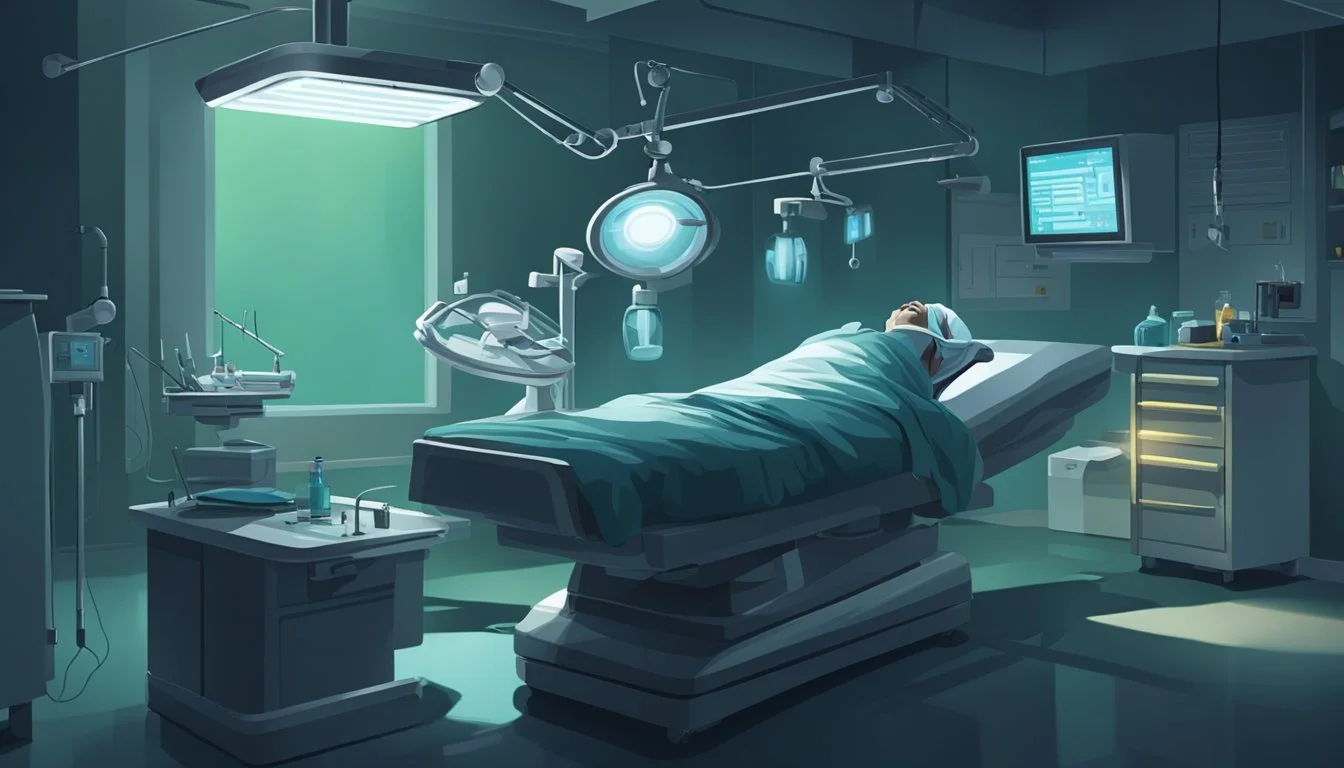Dr. Death: The Horrifying True Story of a Neurosurgeon Gone Rogue
Medical Malpractice Shocks Texas
Christopher Duntsch, known as "Dr. Death," arrived in Dallas in 2010 with an impressive resume and promising career as a neurosurgeon. His credentials boasted an M.D. and Ph.D. from a prestigious medical school, along with a decade of experience and involvement in stem-cell research. However, Duntsch's medical career took a dark turn as he severely harmed or killed most of his patients, leading to his infamous nickname.
The true story behind Dr. Death has captivated audiences through various media adaptations, including a popular podcast and a Peacock drama series. Duntsch's case gained widespread attention due to the shocking nature of his actions and the apparent failure of the medical system to prevent his continued practice.
The horrifying tale of Dr. Death serves as a chilling reminder of the potential consequences when trust in medical professionals is betrayed. Duntsch's actions not only devastated the lives of his patients and their families but also raised serious questions about the oversight and accountability within the medical field.
The Rise of Christopher Duntsch
Christopher Duntsch's journey to becoming a neurosurgeon began with promise but ultimately led to devastating consequences. His educational background and early career moves set the stage for his later notoriety.
Early Education and Medical Training
Christopher Duntsch attended Memphis State University, where he earned his undergraduate degree. He then pursued his medical education at the University of Tennessee Health Science Center in Memphis. Duntsch completed a neurosurgery residency program, which typically takes 7 years.
During his training, Duntsch showed an interest in research and minimally invasive surgical techniques. He spent time in a lab studying stem cells and their potential applications in neurosurgery.
Joining The Dallas Medical Community
After completing his residency, Duntsch moved to Dallas, Texas in 2010. He joined the Minimally Invasive Spine Institute, where he began practicing as a neurosurgeon. The institute promoted innovative surgical techniques for treating back and neck pain.
Duntsch quickly established himself in the local medical community. He presented himself as a skilled surgeon specializing in complex spinal procedures.
Establishing the Medical Career
In 2011, Duntsch founded the Texas Neurosurgical Institute. This move allowed him greater autonomy in his practice. He marketed himself as an expert in minimally invasive spine surgery.
Duntsch began taking on increasingly complex cases. He performed spinal fusions, disc replacements, and other intricate procedures. His practice grew rapidly as he attracted patients seeking relief from chronic pain.
However, concerns about Duntsch's competence soon emerged. Colleagues noted inconsistencies in his surgical outcomes. Despite these red flags, Duntsch continued to operate at various hospitals in the Dallas area.
Dr. Death's Trail of Harm
Christopher Duntsch, infamously known as Dr. Death, left a wake of devastation through his neurosurgical practice. His actions resulted in severe injuries, paralysis, and deaths among his patients, exposing alarming vulnerabilities in the healthcare system.
Disturbing Pattern of Botched Surgeries
Dr. Duntsch's surgical record reveals a shocking pattern of negligence and harm. Over a short period, he performed numerous botched surgeries, leaving patients with life-altering complications. His procedures often resulted in severe nerve damage, excessive blood loss, and improper placement of surgical hardware.
Many patients entered the operating room for routine spinal surgeries but emerged with devastating outcomes. Some were left paralyzed, while others suffered chronic pain or loss of limb function. Dr. Duntsch's lack of skill and apparent disregard for patient safety became increasingly evident with each case.
Patient Stories and Outcomes
The trail of Dr. Death's victims includes several high-profile cases that highlight the extent of his malpractice. Kellie Martin, a 54-year-old teacher, died from massive blood loss during a routine back surgery. Mary Efurd, a 74-year-old patient, woke up unable to move her legs after Duntsch operated on her spine.
Floella Brown suffered a stroke after Duntsch damaged an artery during her procedure. She never regained consciousness and passed away shortly after. Jerry Summers, Duntsch's childhood friend, became a quadriplegic following a cervical fusion surgery.
These stories represent only a fraction of the lives irrevocably altered by Dr. Death's actions. Many patients continue to struggle with chronic pain, paralysis, and emotional trauma years after their surgeries.
Elderly Victims and the Healthcare System
Dr. Duntsch's case exposed significant flaws in the healthcare system, particularly in protecting vulnerable elderly patients. Many of his victims were older adults seeking relief from chronic pain or age-related spinal issues. Their trust in the medical system was shattered by Dr. Death's negligence.
The healthcare system's failure to promptly identify and stop Duntsch's harmful practices raised serious concerns. Despite numerous complaints and red flags, he was able to continue operating for an extended period. This highlighted the need for better oversight, more rigorous credentialing processes, and improved communication between medical facilities.
The impact on elderly victims was particularly severe. Many faced prolonged recoveries, decreased quality of life, and increased dependence on caregivers. The financial burden of additional medical care and ongoing treatment added to their struggles.
The Investigation and Legal Actions
Christopher Duntsch's surgical misconduct triggered a cascade of investigations and legal actions. Medical professionals, regulatory bodies, and law enforcement became involved in uncovering the extent of his malpractice and seeking justice for his victims.
Colleagues Taking Action
Dr. Randall Kirby and Dr. Robert Henderson played crucial roles in exposing Duntsch's negligence. They witnessed the devastating outcomes of his surgeries firsthand and raised alarms within the medical community.
Dr. Kirby wrote letters to the Texas Medical Board, detailing Duntsch's surgical errors. Dr. Henderson reviewed Duntsch's cases and found numerous instances of gross malpractice.
These physicians' efforts were instrumental in alerting hospitals and regulatory bodies to the severity of Duntsch's misconduct.
Medical Board Evaluation
The Texas Medical Board launched an investigation into Duntsch's practice following complaints from fellow surgeons and patients. They reviewed his surgical records and patient outcomes.
The board found evidence of substandard care and dangerous surgical techniques. In June 2013, they temporarily suspended Duntsch's medical license.
After further evaluation, the board revoked his license permanently in December 2013. This action effectively ended Duntsch's medical career in Texas.
The Trial and Conviction
Criminal charges were filed against Duntsch in July 2015. The Dallas County District Attorney's office pursued a case of aggravated assault stemming from his surgical malpractice.
Key witnesses included:
Former patients
Dr. Kirby and Dr. Henderson
Kimberly Morgan, Duntsch's former assistant
The prosecution, led by Michelle Shughart, presented evidence of Duntsch's negligence and reckless disregard for patient safety. They highlighted cases where patients were left paralyzed or died due to his actions.
In February 2017, Duntsch was found guilty. The jury delivered a life sentence, marking the first time a doctor was imprisoned for malpractice in the United States.
Media and Cultural Impact
The Dr. Death story captivated audiences through various media formats, sparking widespread discussions about medical malpractice and patient safety. It gained significant traction through podcast storytelling before transitioning to television.
Public Awareness Through Podcasts
Wondery's "Dr. Death" podcast, launched in 2018, brought the shocking true story of Dr. Christopher Duntsch to millions of listeners. The podcast format allowed for in-depth exploration of the case, featuring interviews with victims, medical professionals, and legal experts.
With over 50 million listeners, the podcast raised public awareness about the dangers of inadequate oversight in the medical system. It sparked conversations about patient rights and the importance of thorough background checks for medical practitioners.
The true crime genre's popularity helped propel the story into mainstream consciousness. Many listeners were drawn to the podcast's compelling narrative and its exploration of systemic failures in healthcare.
Television Adaptation
Peacock's "Dr. Death" series, released in 2021, brought the story to an even wider audience. The show starred Joshua Jackson as Dr. Duntsch and Christian Slater as one of the physicians who worked to stop him.
The television adaptation dramatized key events from the podcast, visually depicting the horror of Duntsch's actions. It emphasized the real-life impact on patients and their families.
By casting well-known actors, the series attracted viewers who might not have been familiar with the original podcast. This expanded the reach of the story and further increased public awareness of medical malpractice issues.
The show's critical reception helped maintain media attention on the case, prompting discussions about patient safety and the need for stricter regulations in the medical field.
Aftermath and Healthcare System Implications
The Duntsch case exposed critical flaws in medical oversight and patient safety protocols. It prompted significant reforms in healthcare governance and ignited discussions about accountability in the medical profession.
Changes in Medical Governance
Texas implemented stricter regulations for neurosurgeons following the Duntsch scandal. The state mandated more thorough background checks and enhanced monitoring of surgical outcomes. Hospitals now face increased scrutiny when granting operating privileges.
The National Practitioner Data Bank improved its reporting mechanisms. This made it harder for problematic doctors to move between states undetected. Medical boards across the country reassessed their disciplinary procedures.
Surgical training programs intensified their focus on ethics and patient safety. They implemented more rigorous evaluations of residents' skills and judgment.
Broader Implications for Patient Safety
The case highlighted the need for better systems to identify and address physician impairment. Hospitals developed more robust protocols for detecting substance abuse among medical staff.
Patient advocacy groups gained momentum, pushing for greater transparency in healthcare. Many states passed laws requiring hospitals to disclose more information about medical errors.
The healthcare system saw a shift towards team-based approaches in complex surgeries. This aimed to reduce the risk of a single doctor's mistakes going unchecked.
Malpractice insurance companies revised their policies, encouraging earlier intervention in cases of suspected incompetence.
Conclusion
The case of Dr. Christopher Duntsch shocked the medical community and the public. His actions as a neurosurgeon resulted in devastating consequences for numerous patients.
Dr. Duntsch's story highlights critical issues in medical oversight and accountability. It raises questions about how such egregious malpractice could continue unchecked for so long.
The efforts of fellow doctors and investigators ultimately brought Duntsch's crimes to light. Their persistence led to his conviction and life sentence, providing some measure of justice for victims.
This case prompted reforms in medical licensing and disciplinary procedures. It underscored the need for more rigorous screening and monitoring of surgeons.
Dr. Death's story serves as a stark reminder of the immense trust patients place in their doctors. It emphasizes the critical importance of maintaining high ethical and professional standards in medicine.
The impacts on Duntsch's victims and their families were profound and long-lasting. Many continue to deal with permanent disabilities and ongoing health issues as a result of his actions.
This case will likely be studied for years to come in medical ethics courses. It offers valuable lessons on the responsibilities of healthcare providers and the systems meant to protect patients.



